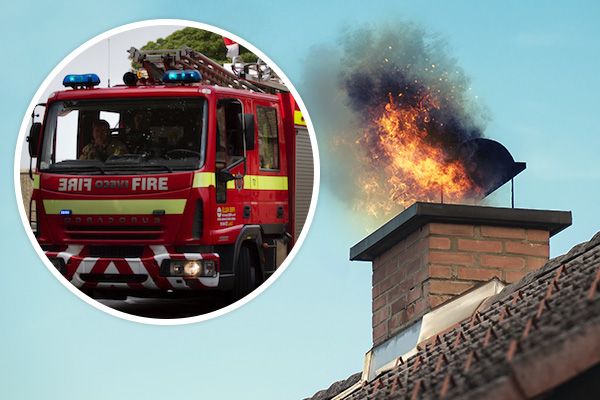


As temperatures begin to cool, the Guernsey Fire and Rescue Service is warning local households about the danger of chimney fires - which still make up around 20% of all fires in the island.
Although most chimney fires are preventable, the service was called out to 13 in the first half of this year.
"In 2017 we had a total of 17 chimney fires, but last year we saw a bit of a spike and had a total of 26, so we saw quite a significant increase," said Head of Fire Safety, Martin Lucas. "If that trend continues we could be in the mid-twenties to even low thirties by the end of this year."
GFRS recommends all households have their chimneys or flues cleaned regularly, and has issued advice which varies dependent on the type of fuel being used.
"If you're burning smokeless fuel we recommend that you have your chimney swept once a year," Mr Lucas continued. "It is one of the cleanest fuels to burn and it's better for the environment.
"With wood, we would always say use kiln-dried wood because it's had all the creosote and tar dried out of it naturally - it's by far the best. If you're using wood then you should think about sweeping your chimney every three months when the fire is in use because there's a big build-up of soot there.
"Again, if you're using the old-type coal we're recommending quarter while that fire is in use."
Anyone using oil or gas are advised to clean their chimneys at least once a year.
"We would always recommend you go to a professional chimney sweep because they are set up with the brushes and the vacuum that sucks all the soot in," said Mr Lucas. "It's very clean and obviously they are professionals. You could try to do it yourself, but you may encounter what we call 'soot drop', which is when you're pushing brushes up a chimney and all of the soot in the whole chimney becomes unstable and drops down past the brush, out into the lounge. That is a very, very messy experience."
The majority of chimney fires are caused by infrequent sweeping and cleaning, burning unseasoned wood and overnight burning or smouldering wood for long periods in wood stoves.
Pictured: The Fire Service has already attended 13 chimney fires this year.
"The build-up of the soot becomes dry and then you have the other elements of tar and other flammable things that just get superheated and eventually will catch fire," Mr Lucas added. "Some of those things can be little sparks coming out of yore chimney that your neighbours might notice. If there's a severe build-up it looks like a jet engine coming out of your chimney, so it can be quite impressive at times.
"If you've got a blocked chimney, which could be from faulty brickwork or a bird's nest when you light the fire the smoke will not be able to rise and it backfills and comes out into the room. Smoke causes a lot of damage by itself."
Anyone who notices excessive smoke, embers falling back into the hearth, sparks shooting from their chimney or the walls of the chimney breast becoming too hot to touch should call 999 immediately.
The Fire Safety Team can be contacted on 724491 or firesafety@gov.gg for further information and advice.
Comments
Comments on this story express the views of the commentator only, not Bailiwick Publishing. We are unable to guarantee the accuracy of any of those comments.